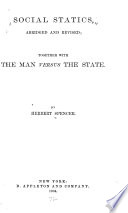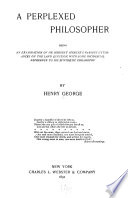 | Henry Willard Austin, John Storer Cobb - Socialism - 1890 - 502 pages
...a young man, wrote a book called " Social Statics," in which he assumes as a first principle that " every man has freedom to do all that he wills, provided he infringes not the like freedom of any other man." From this principle he tries to prove that society is simply a voluntary... | |
 | Christopher Gustavus Tiedeman - Constitutional law - 1890 - 184 pages
...injury to others ; or, to employ the language of Herbert Spencers: " Every man has freedom to do aught that he wills, provided he infringes not the equal freedom of any other man." The prohibitory operation of the law must be confined to the enforcement of the legal maxim, sic utere... | |
 | J. Morrison-Fuller, Walter C. Rose - Political science - 1891 - 566 pages
...liberty of each limited only by the like liberty of all, or by saying, Every man is free to do that which he wills, provided he infringes not the equal freedom of any other man. Repeatedly and emphatically as the philosopher has explained the genesis of the idea expressed by this... | |
 | Science - 1891 - 902 pages
...The formula of justice may accordingly be expressed by saying, "Every man is free to do that which he wills, provided he Infringes not the equal freedom of any other man." Mr. Spencer incidentally defends with great ability the approximate validity of fixed intuitions or... | |
 | Literature - 1891 - 530 pages
...however, remains to Mr. Spencer the same after forty years — that "every man is free to do that which he wills, provided he infringes not the equal freedom of any other man." But this does not mean that all men are •Justice ; being Part IV of the Principles of Ethics. By... | |
 | Laurence Gronlund - Socialism - 1891 - 280 pages
...That is why young Spencer could not draw any sound conclusion from his socalled " principle "—" That every man has freedom to do all that he wills provided he does not infringe on the like freedom of any other man "—because no one can do any wrong act, without... | |
 | Science - 1892 - 930 pages
...it indirectly. He then reasons out as a first principle controlling the pursuit of happiness that " every man has freedom to do all that he wills, provided...infringes not the equal freedom of any other man." Applications of this first principle constituted the rest of the original volume. Many of these applications,... | |
 | Herbert Spencer - Social evolution - 1892 - 442 pages
...function of guiding us in this matter; we are alike taught, as the law of right social relationships, that •—-Every man has freedom to do all that he wills,...infringes not the equal freedom of any other man. Though further qualifications of the liberty of action thus asserted are necessary, yet we have seen... | |
 | Henry George - Land use - 1892 - 346 pages
...it unavoidably follows that they have equal rights to the use of this world. For if each of them " has freedom to do all that he wills, provided he infringes not the equal freedom of any other," then each of them is free to use the earth for the satisfaction of his wants, provided he allows all... | |
 | Henry George - Economics - 1911 - 326 pages
...compatible with the possession of like liberty by every other man." Or, as he otherwise puts it, that " every man has freedom to do all that he wills, provided he infringes not the eqnal freedom of any other man." The first deduction he makes from this " first principle" is the equal... | |
| |